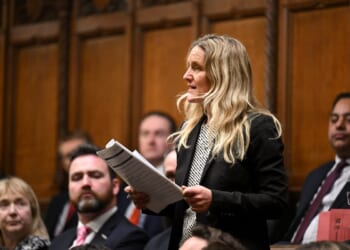Sean Worth is director of Conservative Friends of Business and a former Downing Street adviser.
Strong economies need strong relations between businesses and policymakers. An open and honest dialogue about what the economy needs to thrive, create jobs and generate the income needed to fund public services.
This is why Conservative Friends of Business will be launched this evening. At an event in the House of Commons, Kemi Badenoch and Conservative MPs will meet with large and small business from all over the UK, from a range of different sectors.
The organisation was originally formed in 2022 and announced at a business reception in CCHQ with then-Chancellor, Jeremy Hunt, and run by myself and another former Conservative party adviser, Lewis Sidnick. With the party in government, the organisation played a small, independent role in helping businesses debate with Conservative politicians on key issues around investment, taxation, regulation and public spending.
Now, it will continue to be a strong defender of business interests, but in its new form will create a bigger platform to engage with senior Conservatives on all economic and business issues. It will develop a new Business Network that will be open to all businesses to engage, whether supportive or not of the party, and its activities will include events, research and a new forum to debate policy.
The Conservative Party admittedly lost its focus on business at the last election and Conservative Friends of Business aims to help it win it back. It will become a new platform to help improve relations with politicians and drive better policymaking towards growth.
So, what issues will we focus on?
With the Spring Statement coming this month, the business community is clearly concerned about the direction of our economy. Rising business taxation and regulation, combined with an outlook of anaemic growth, are key reasons that the latest survey of UK businesses from the Office for National Statistics shows only one in five believe they will grow this year.
Taxation and regulation are obvious start points. One of the first acts of the Labour government has been to make it more costly for businesses to hire people through the rise in national insurance, which kicks in next month. More regulation on employers is also in the pipeline.
The Conservatives in Government, however, also raised taxes on business, increasing headline corporation tax from 19% to 25%. And on regulation, the Centre of Policy Studies recently showed it raised regulation on business to the tune of around £6 billion a year.
We are clear that the burden of both taxation and regulation on business is too high and should be reduced in order that the economy grows. We will be helping business make that case, both to the government and to the Conservative Party’s new leadership as it prepares to set out its direction of policy.
Another, more complex area is encouraging investment. Britain has huge strengths as a place to invest, but there is a vast amount to do to improve our country further. Our labour force has millions off sick and on long-term benefits, and skills across much of our workforce are too low. Public transport in key areas is very bad and blackspots in digital connectivity remain.
To encourage investment across the UK we need these issues dealt with, fast. The obvious problem is their cost, but unlike the endless spending increases on welfare or the NHS, the positive payback to the real economy of investments in physical and digital infrastructure is much clearer and more direct. Upgrades need to happen as soon as possible as the cost will be more than reimbursed through the growth they create. We will be setting out research on this.
Another area is macroeconomic policy. The Government is beginning, in June, an industrial strategy to put extra effort behind some key sectors and activities that will help the UK take more leading positions in the global economy. We will be active in this area, too.
The Conservative Party has for a long time shied from any plan that effectively picks winners among business sectors, but our view is that, in the modern economy, that view is outdated. While it must be very carefully orchestrated with the business community, government does have an obvious role to play to ensure the macro-economic framework helps us take a lead in key growth areas of the global economy. Investment in science and technology is a no-brainer. As is work to improve our digital connectivity and skills base.
Conservative Friends of Business will be tackling these issues and many more. The businesses we have spoken to over the months since the election positively welcome the idea of Conservatives doing a great deal more to hold government to account on business and economic policy, and to ensure that business debate remains at the heart of the Party’s activities as it rebuilds itself from election defeat last year.
An obvious question is whether this is really a priority for the party right now and the answer must be a resounding yes. Inflation is rising and taxes are going up. Employment is below pre-pandemic levels, while public sector and welfare spending are too high. Our economy is not growing to pay for any of this and our national debt is already over 95% of our GDP.
The Conservative Party must rebuild itself as the party of business and Conservative Friends of Business and its new Business Network will help it do exactly that.






![Trump's Admin Guts Another ‘Rogue Government Agency with Zero Accountability’ [WATCH]](https://www.right2024.com/wp-content/uploads/2025/03/Trumps-Admin-Guts-Another-‘Rogue-Government-Agency-with-Zero-Accountability-350x250.jpg)
![‘We All Owe Him (Elon) a Huge Debt of Gratitude’ [WATCH]](https://www.right2024.com/wp-content/uploads/2025/03/‘We-All-Owe-Him-Elon-a-Huge-Debt-of-Gratitude-350x250.jpg)









